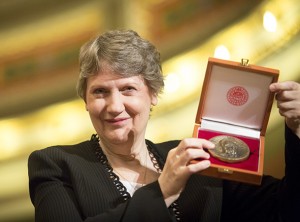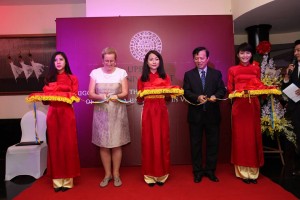There’s a lot going on. Both Anders and I have been travelling recently, with no time to keep writing our usual blog posts. But we’re now going to summarise a few highlights of the past few weeks. The visits to Campus Gotland have been commented on in separate blogs.
In the past week, we’ve had domain reviews with the management of all three disciplinary domains. The discussions during the retreats for the management staff and deans continued at the reviews, and touched on the broad notion of university and its meaning. What are the forms required to make best use of the strengths of the wide-ranging, complete international research university? The domains can prepare documentation for discussing a few priority issues that are advantageous to pursue jointly. Discussions were also held on developing our collaboration, nationally and internationally. Development in terms of volume and quality in education and research, as well as internationalisation and skills provision, were self-evident themes. Discussions in the course of the domain reviews were structured on the basis of the following questions:
- How should we deal with the strategic initiatives in the University’s operational plan for 2015 at domain and faculty level?
- What strategic issues exist at domain and faculty level?
- What strategic issues need addressing in the University’s operational planning for 2016?
- What should we pinpoint for the Government in the budget documentation for 2016–18?
 The Dag Hammarskjöld Lecture was well attended. This time, Helen Clark, the Director of UNDP and former Prime Minister of New Zealand, came to give the lecture in the Grand Auditorium. It was resonant and interesting. Fifty-three years after his death, Dag Hammarskjöld remains an inspiration.
The Dag Hammarskjöld Lecture was well attended. This time, Helen Clark, the Director of UNDP and former Prime Minister of New Zealand, came to give the lecture in the Grand Auditorium. It was resonant and interesting. Fifty-three years after his death, Dag Hammarskjöld remains an inspiration.
The Taipei Mission came to visit, and we discussed collaboration between universities in Taiwan and ourselves. We already have collaboration agreements, covering both education and research, with outstanding universities in the island nation. We talked about how we can intensify the existing collaboration projects and develop them further.
On Saturday I travelled to Vietnam, one purpose being to open our new office in Hanoi. The aim of our internationalisation efforts is to strengthen our position in Asia. The University already has several joint projects under way in, for example, business studies, women’s and children’s health, and government. Since 2009 we have implemented a Master’s Programme in Public Management (contract education) seven times. Vietnam is a country where, historically, Sweden has a unique position and where we see interesting opportunities for developing new collaborations. Earlier this year, we signed an agreement with Vietnam International Education Development (VIED), which funds Vietnamese students’ education abroad. In conjunction with the visit, the Lotus+ (Linking organisations through university synergies) project, part of the EU Erasmus Mundus programme, had its kick-off in Hanoi. This programme, coordinated by Uppsala University, has 20 partners and a budget of some SEK 30 million in scholarship funding to use for mobility at Bachelor’s, Master’s and postgraduate level (first-, second- and third-cycle education), and also for postdoctoral students and staff.

